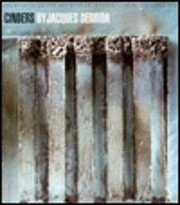

Auf ein Miniaturbild klicken, um zu Google Books zu gelangen.
|
Lädt ... Feuer und Aschevon Jacques Derrida
 Keine Keine aktuelle Diskussion zu diesem Buch. Keine Rezensionen keine Rezensionen | Rezension hinzufügen
Gehört zur ReihePosthumanities (28)
" "More than fifteen years ago," Jacques Derrida writes in the prologue to this remarkable and uniquely revealing book, "a phrase came to me, as though in spite of me. It imposed itself upon me with the authority, so discreet and simple it was, of a judgment: cinders there are (il y a là cendre). I had to explain myself to it, respond to it--or for it." In Cinders Derrida ranges across his work from the previous twenty years and discerns a recurrent cluster of arguments and images, all involving in one way or another ashes and cinders. For Derrida, cinders or ashes--at once fragile and resilient--are "the better paradigm for what I call the trace--something that erases itself totally, radically, while presenting itself." In a style that is both highly condensed and elliptical, Cinders offers probing reflections on the relation of language to truth, writing, the voice, and the complex connections between the living and the dead. It also contains some of his most essential elaborations of his thinking on the feminine and on the legacy of the Holocaust (both a word--from the Greek holos, "whole," and kaustos, "burnt"--and a historical event that invokes ashes) in contemporary poetry and philosophy. In turning from the texts of other philosophers to his own, Cinders enables readers to follow the trajectory from Derrida's early work on the trace, the gramma, and the voice to his later writings on life, death, time, and the spectral. Among the most accessible of this renowned philosopher's many writings, Cinders is an evocative and haunting work of poetic self-analysis that deepens our understanding of Derrida's critical and philosophical vision. "-- Keine Bibliotheksbeschreibungen gefunden. |
Aktuelle DiskussionenKeineBeliebte Umschlagbilder
 Google Books — Lädt ... Google Books — Lädt ...GenresMelvil Decimal System (DDC)401.41Language Language Philosophy and theory Communication; semantics, pragmatics, languages for special purposes Discourse analysisKlassifikation der Library of Congress [LCC] (USA)BewertungDurchschnitt: (3.6) (3.6)
Bist das du?Werde ein LibraryThing-Autor. |
||||||||||||||||||||||||||||||||||||||||||||||||||||||||||||||||||||||||||||||||||||||||||||||||||||||||||||||||||||||||